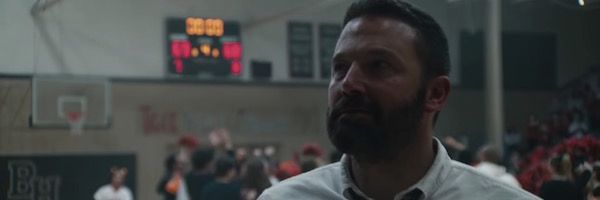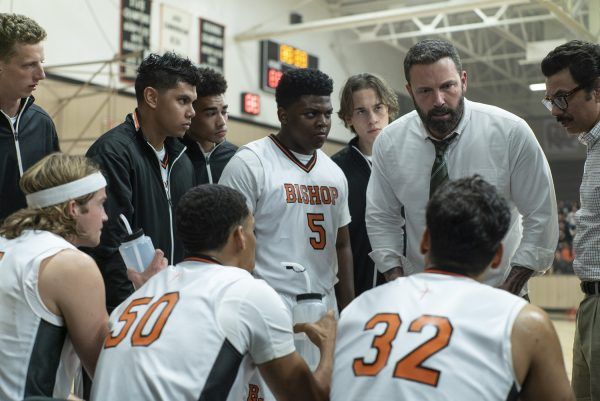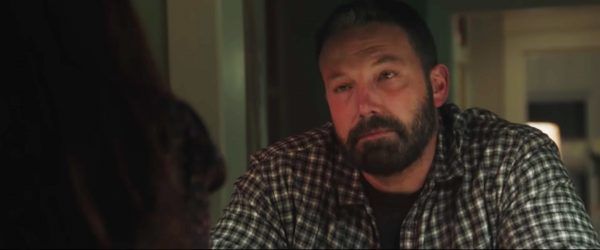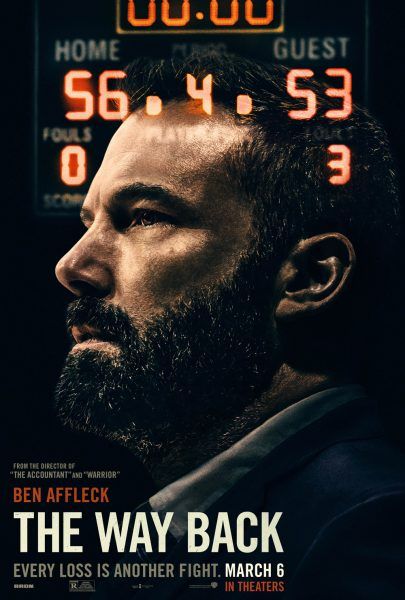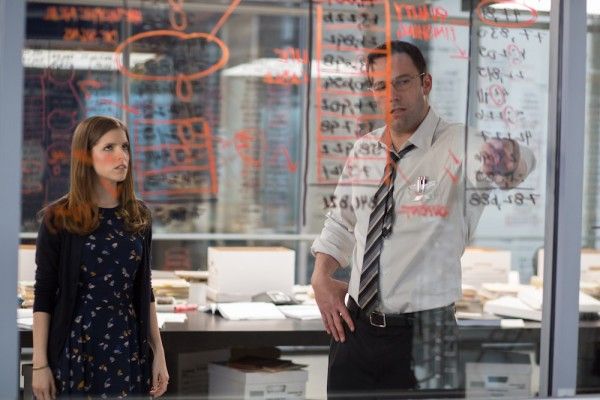After a few turbulent years both professionally and personally, Ben Affleck's busy upcoming schedule suggests he's most definitely stepping back into the spotlight, but it's not exactly the big franchise glare of the Bat-Signal. The two-time Oscar winner's first major theatrical release since 2017's Justice League is the personal, introspective sports drama The Way Back, which reunites the actor with his The Accountant director Gavin O'Connor. Affleck plays Jack Cunningham, a former high-school basketball phenom whose adult life descended into alcoholism. At rock bottom, Jack gets a chance at redemption when he's asked to coach the same basketball team that once hung his jersey in the rafters. It's a remarkable turn from Affleck, uncomfortably live-in and real, the type of performance where you feel like you're intruding on someone's therapy but can't look away.
I recently sat down in New York City with Affleck and O'Connor, where we discussed The Way Back, why sports films are the perfect avenue to tell redemption stories, and whether Affleck has his own Jack Cunningham. The duo also offered updates on a potential Accountant sequel, Affleck's in-development film based on the McDonald's Monopoly scam, and The Last Duel, the period drama Affleck co-wrote with Matt Damon and Nicole Holofcener that has Ridley Scott on board as director.
This movie reminded me a lot of Warrior [also directed by O'Connor], just in the way it uses sports as a path to redemption. What is it about sports that works so well in redemption stories?
GAVIN O'CONNOR: I guess I feel that sports, it's a demonstration of what's inconceivable can become conceivable. This idea, the impossible is what no one does until they do it. I know that can happen off the field and off the court, but sports is the most beautiful sort of dramatization of those kinds of ideas.
And I remember being a young boy, I grew up on Long Island, and I would get the New York Newsday. I remember the front page always had these dire stories. War, and crime, and murder. I just remember, then I'd go to the back page, and it was always a celebration of sports. Of something unbelievable. So it was like, "Fuck, I'm starting at the back page and work my way that way". I remember thinking that as a little boy. And I played sports growing up, and my struggle was always as an artist, but I played sports. I always say basketball is like life in short pants out there. Sports is a metaphor, especially team sports, not individual sports. It's really just a metaphor for life.
Especially basketball, yeah. It's up and down, constantly back and forth.
O'CONNOR: It's competition, discipline, attention to detail. All these things, to be really good at sports, especially as a team, you can apply those same kinds of tenets to life.
BEN AFFLECK: What really moved me in terms of the experience of making the movie, was, because I didn't have as much experience with [playing sports], was...the different personalities having to work together for a common goal. Trying to unite people to a common purpose, and to inspire people. That experience was really rewarding just artistically to do performance-wise. Also, I think it's a really good metaphor for stuff in life. Like Gavin said, doing things that are difficult. We love to see people face real challenges and overcome them, and do something incredible. That clearly inspires us, because that's why everyone watches the NFL and the NBA, for those great moments. Clearly we connect to them on a deeper level than just hitting a ball with a bat, which in itself has no meaning.
O'CONNOR: I also think that these kind of movies, when they're done at their best, are not about the sport. I you look at a movie like Rocky, which was an indelible film for me, that's a very different movie if Rocky beats Apollo Creed. We're not talking about that movie. Because the personal victory is just going 12 rounds.
AFFLECK: Yeah, the irony is the best line in that movie is "No rematch." "Don't want one."
Is that part of why the title changed from The Has-Been? Was it like you didn't want to dwell on that aspect of it?
AFFLECK: When it started there was a lot more focus on the idea of, "What's it like when you were a big star and you're not anymore?" The focus was more on, "Everyone used to know Jack, and he was so great and what happened to him?" Then, as it kind of got developed, that aspect of it got de-emphasized. So some of it in the writing, some of it in scenes that got cut. The heart of the movie ended up about being something much deeper than just, "Hey, everybody used to love you and now you're washed up". The themes became sort of richer and more resonant to me, and it didn't seem like an appropriate title anymore.
We kind of kicked around titles a bunch. It was hard to figure it out. But happy with where we ended up. It feels better than The Has-Been. The Has-Been also has a negative connotation. Whereas this feels appropriately inspirational, and motivating, and positive, and uplifting.
How did the arc of the movie itself chang the more you changed the themes of it?
O'CONNOR: I think the initial script was looking backward more than it was looking forward. Ben and I wanted the trajectory of the film to be a guy that's moving toward some type of redemption. So we were massaging the script that way. Tthere were times where I would call them in the morning going, "Hey, well let's do this". We were rewriting scenes on set, and so the beauty of that is you could write three new pages in the morning and Ben...he knew all the lines, like that. He's facile that way, which was liberating as well, because once we were in it we were really playing and trying things. We were adding things to the script, and well, "Let's get rid of that and do this now that we know that the journey we're on with the character".
AFFLECK: It's definitely a kind of filmmaking that I would have been much more nervous about with a director that I didn't, A) know well, B) really respect, and C) felt that was really comfortable both in the genre of dramatic storytelling as well as sports. So I was not scared at all. It was more I felt like we were on the same page, and we were coming up with stuff as it was going. Gavin and I both kind of feel like, I think philosophically, "Okay, let's try this, let's take this risk, let's try this take on it, you can always take it out later". You have to trust the director to not make you look bad, and I trusted Gavin completely. So I was willing to try whatever kind of ideas he came up with. Usually, movies do kind of talk back. There is a sort of, a process of discovery. You get halfway through a movie, you see, "Oh this stuff is really emerging and this other stuff is fading away". An experienced director will react and respond to that, and steer towards the direction that the movie seems to be wanting to go.
When you look back on the arc of your career, do you have a Jack Cunningham figure? Someone that at a young age, or at an early stage in your career got you on the right path?
AFFLECK: Like I said, I wasn't really ever a very good athlete. I played baseball, but that was the only sport that I was really good enough to play competitively, but ended up getting interested in acting very young. Once I went to high school, there was a very serious drama program. It was really lucky. It was a public school and they just had a great theater program, and the guy who was a teacher, it was a guy named Gerry Speca who was from Carnegie, Pennsylvania...he was somebody that really, really inspired a lot of people, including me. A big part of what he left us with was a sense of taking it really seriously, working as hard as you could. It was very strict. You were on time, you were committed. We did a lot of hours. Ultimately there was a point when I was a senior when he took me aside and said, "I think you could do this, this is something that you want to pursue, I think you should, I think you have the ability". I'll never forget that. The words as coming from an older man who I respected, and in the field, to me at 17 made a huge difference in my life.
Because you meet a lot of frustration and rejection as an actor starting out. There's a lot of people who just change course. Having that encouragement meant the world to me. It's that sort of weird, interesting place that a coach and a mentor fits in. They're not a parent. Parents are supposed to kind of love you and root for you no matter what. Like, yeah, mom likes all my movies, you know what I mean?
A little biased, yeah.
O'CONNOR: But do you think you would've pursued the career if he didn't say that to you?
AFFLECK: I think if there's one single moment that made a difference in terms of pursuing the career, it was definitely that. I don't know, I like to think that I would have persevered no matter what. I didn't have..., a lot of actors worked a lot, labored a lot longer in frustration, and I did have about five years of really struggling and kicking around. But I relied on that memory of that moment in a lot of frustrating times.
When you look back, that's the turn moment?
AFFLECK: That was definitely a huge rung for me. And mentors can play huge roles in developing the lives of young kids. That's why I think, when I think of coaches, it's great to be..., sure I mean, yeah I'd love to be Phil Jackson or one of those greats. But also you can't overestimate the degree to which people coaching and mentoring young people, are having an effect on their lives in many, many ways beyond just the sport. But really helping shape and form their character and their confidence. And that's a big deal. I think that's heroic work.
Have you guys ever discussed an Accountant sequel?
AFFLECK: We’ve talked about it. There seems to be a debate whether or not to do a TV series version of it. The scriptwriter [Bill Dubuque] has become quite successful and busy, so he’s off doing his thing. And somebody said to me, ‘Well if we could find a script that we could retrofit and make into a sequel… But that’s sort of tricky because the personality of the character is so specific, that doesn’t really work to just say, "Well, we used to call this script Action Movie Shootout, and now we’re going to call it The Accountant 2."
But it is one of the few movies that I've worked on, that I'd be thrilled to work with Gavin again and do that. Anyway, I had a great time. It was a lot of fun. It was an interesting twist on the genre and I'd love to do it. And if they want to produce a TV show version of it and I get some royalties, well that's great too.
Is that McDonald's Monopoly scam movie still on your docket?
AFFLECK We’ve gotten a new draft. That’s really good. Hollywood’s a weird place, because the person who was running the studio when they bought that script, just left that job. And the studio that was going to make it got bought by another studio. So there’s these moments where things sort themselves out, and you sort of see “Is this still a priority, or are they really interested in different kinds of movies?” And I’m not sure whether or not, McScam, what kind of priority it is. We really like it. We’re still developing the script. I’m about to go shoot my part in this Ridley Scott movie [The Last Duel] that I wrote with Matt Damon and Nicole Holofcener. And so I finished [Deep Water] with Adrian Lyne, which was a lot of fun, and he’s a really interesting guy. It’s just so rewarding to work with directors that you can learn from and whose stories you got to get out. I mean, he’s telling stories about David Lean, you know what I mean? It’s incredible!
But yeah, I'm staying busy. The balance is really, for me is about being away from home and away from the kids. They're at ages now where it really matters, being present, being consistent, showing up. So it's a struggle. And frankly, to be totally honest, it's really hard that no one makes movies in L.A. anymore. Because it means if I want to make a movie I have to go somewhere else. It used to be you worked in L.A., you had your family in L.A. and you were home for dinner and you could have that kind of living. It wasn't such a peripatetic thing. I find that frustrating, and it dictates some of the choices that I make now, because I want to make sure I have a nice block of time where I'm around. That just can mean driving them to soccer practice, or swim practice, or school. That's where the real parenting stuff happens in my experience. When I was young I just wanted to work and get successful and chase after it, and now I really have to weigh that against the time at home.
One last question for the both of you: We give you a basketball right now, who wins one-on-one?
AFFLECK: Probably Gavin, sadly. Even though I'm so much younger than him. [laughs]
The Way Back is now playing in theaters everywhere.

